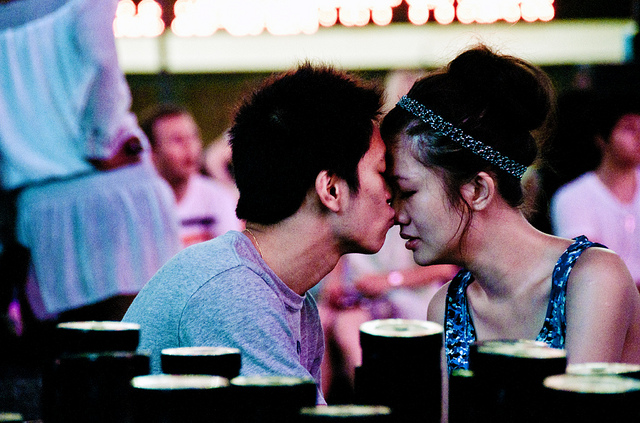We know this one well:
Man meets woman.
Man and woman start dating.
Man and woman like being around each other—at first.
Things are playful and fun and easy, and both of them are at the top of their game, especially when it comes to presenting themselves in a matter that is all nicely packaged and just as shiny as a brand new car.
Maybe they’re each on a roll with what they consider unsuccessful relationships. They don’t expect much, and are proud that they have “low expectations”—because this is helpful, right? We can’t lose a whole lot that way.
Or, maybe each of them has been a bit more selective, a bit more independent and has maybe even closed off a bit to romantic relationships because to say that we have been “focusing on ourselves” has become trendy. And while we should be focused on ourselves and our emotional health and well-being, many have closed their hearts and have fears about vulnerability—and so we use it as a disguise, sometimes when we are not even aware that it is happening.
But, the more time that we spend with someone, the more likely it is that things are not going to align 100 percent, all of that time. If that actually was happening—someone would have to be lying, either to the other to maintain peace, or to themselves about how they really are feeling.
Conflict can arise.
Emotional discord can come to the surface.
While we do not want to seek out other people with whom we hardly align, we also do not want relationships that do not offer any type of disharmony, because those relationships offer us absolutely no opportunity for expansion, and in order to grow—in order to become more of what we are so that we can receive more of the beauty that this world has to offer—we want expansion.
So, with that said, here is the real challenge—and this is where the gold is:
We can tell how in alignment we are with ourselves by the way that we feel when we are with someone.
But here is the catch—they are never, ever responsible for how we feel.
We are. Always.
So, we find the greatest ease in the relationships in which we feel we have the easiest time aligning with ourselves. Meaning: “I feel pretty good when I am around you, but that is not because of you, it is because I have an easier time finding my own good feeling while I am with you.”
We have such a powerful propensity to then take that information and make it about the other person. Instead, both our responsibility and opportunity, first and foremost to ourselves and secondly to the “other,” is to stand firm in the wisdom that they are never responsible for how we feel—good or bad.
That is on us.
So, what if there is an argument and they say hurtful things? What if they promised they would be there, and they cancelled plans, yet again? What if they are either so closed off and avoidant, or so overbearing, that we can hardly think, let alone breathe or have the space to actually love them?
This is information. We have the power within ourselves to discern that anything hurtful only stems from their hurt. We have the power to choose how we respond, whether that is exiting the situation or choosing a compassionate and empathetic response—we choose according to our own emotional capacity in that moment according to what feels right.
This is never about blame, it is about emotional accountability and with it comes infinite opportunities for both freedom and autonomy. Committing ourselves to coming back to this “sweet spot” is all that’s required to give any relationship a solid chance at not only surviving, but thriving.
When we find this “sweet spot,” we realize these truths:
It does not matter what you do, I am responsible for how I feel.
I do not need this relationship to feel great, I want it because it is fun and I find joy in your company.
This relationship is a beautiful opportunity. I am reminded when I lean too far—toward or away from you—how to come back into my own completeness, into what makes me, me. I understand that my relationship with myself comes first, before anything else in this world, and I love myself enough to not lose myself to you.
I am in this for the connection, moment by moment, and not for any results, because becoming too distracted by expectation takes me out of that moment.
With all of this said, some relationships are too difficult for us to maintain our own independence, emotionally. After all, we are all human and our capacities and strengths vary from person to person.
Some people can poke at our wounds, and until the wounds have healed, we will attract these relationships—most of us have seen the patterns. When this happens, we have the opportunity to stare it right in the face and say: “No, this is not true. This is not who I am. Ido not want this.”
This is discernment.
This is healing.
This is growth and this is necessary, for us as individuals and as a culture.
A helpful exercise to do during relationship struggles is to write down the areas where we feel that our partner is failing us or lacking in some regard. For example, a client and I did this recently and she stated that her biggest challenges in her relationship were that she felt her partner did not prioritize time with her, did not love her body as much as she wanted, and did not value her enough when it came their co-owned business.
Areas where we often feel that someone else is failing us are ultimately the areas where we can bump things up a few notches ourselves when it comes to this sort of emotional independence. I asked her how it felt when I suggested that she had not been prioritizing herself when it came to time, that perhaps she did not love her body as much as she could have, and that she was not placing value on herself when it came to her role in the business.
Sometimes these truths can be hard to swallow, but they do not have to be.
We get to choose.
The more we love ourselves, the less resistance we will have to this type of healing. The more we commit to our own responsibility for how we feel within any relationship dynamic, the better the odds that the relationship will thrive.
~
Author: Katie Vessel
Image: mbtrama/Flickr
Editor: Catherine Monkman









Read 0 comments and reply